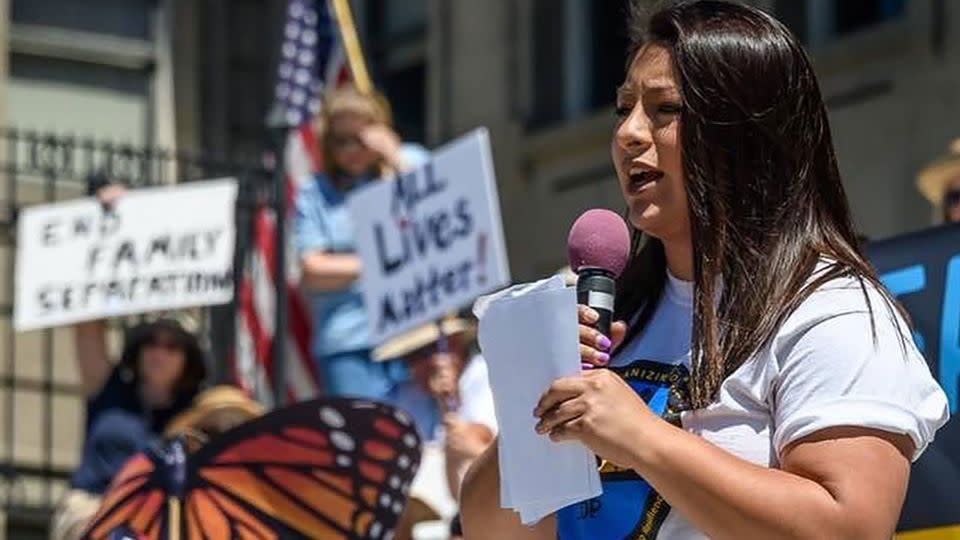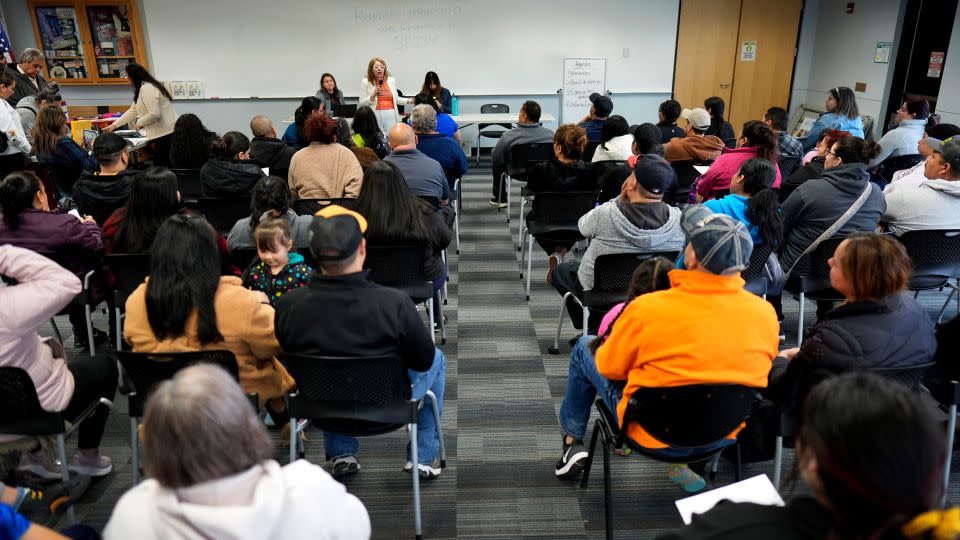A controversial Texas law has become a blueprint for other states. Immigrant communities are worried
Maria Acosta’s heart sinks every time she hears the question.
“Señora, do I need to move?”
Immigrants in Iowa keep asking her. And Acosta says she doesn’t know how to respond.
“I feel powerless. I feel frustrated,” says Acosta, a community organizer for the Iowa Migrant Movement for Justice. “What can I tell people? I can’t tell them, ‘Oh, no, everything is going to be fine.’ I don’t know if everything is going to be fine. Right now, it’s not fine at all.”
Last month, Iowa lawmakers swiftly passed a bill that would allow local police to arrest some undocumented immigrants and give state judges the power to order deportations. And Wednesday, the state’s governor signed it. The law isn’t scheduled to go into effect until July 1, but Acosta and other advocates say concern and confusion are already running high in immigrant communities.
“It affects me when I see the fear on their faces. They don’t know what to do,” Acosta says, “even though they’ve been living here for 10 or 15 years, and this is their home.”
Iowa is among at least nine states this year that have weighed restrictions mirroring portions of the Texas immigration law known as SB 4, according to the National Conference of State Legislatures. Proposals are still pending in some states. In others, they’ve failed to pass.
It’s unclear how officials would enforce and fund the Iowa measure, which is known as SF 2340. It’s likely to face legal challenges, which means its implementation could be delayed or even blocked in court, like the Texas law that inspired it has been so far. But advocates say this uncertainty hasn’t eased worries about potential racial profiling and erosion of trust between law enforcement and communities.
“How would you deport someone? And who? … No one knows how this law actually could be or would be applied,” says Erica Johnson, executive director of the Iowa Migrant Movement for Justice.
This college student has already decided to leave
Enya Cid doesn’t plan to stick around to find out.
Next month, the 21-year-old is scheduled to graduate with a political science degree from Grand View University in Des Moines.
She was weighing grad school options last month when Iowa lawmakers voted to pass the immigration bill. Cid says that pushed her to make a difficult decision about her future.
“I no longer want to live in a state where I feel like I’m not valued,” says Cid, who was brought to the US from Mexico when she was a toddler and says she has lived in Iowa for the past 18 years.
Cid says she’s applied for a U visa, which provides legal residency and deportation protection for victims of crimes, and says she’s been granted a work permit while her application is pending. But she fears that wouldn’t stop her and many other undocumented immigrants in a similar position from being targeted under the new measure.
In addition to Iowa’s new law, Cid says several recent immigration proposals in the state failed to clear the legislature. Altogether, they’ve “caused a lot of chaos and fear in my community,” she says.

Now, she says, despite her recent acceptance into grad school at the University of Iowa, that option is off the table. She’s planning to leave the state and weighing out-of-state programs in Arizona and New Mexico, where she hopes to study urban planning.
“I may not be eligible to vote,” she says, “but I can vote with my feet.”
The passage of SF 2340 in Iowa, Cid says, “was the nail in the coffin that made me feel not safe.”
But even when she leaves Iowa, Cid says many family members she loves will remain. She’s well aware that not everyone has the luxury of leaving.
“As easy as it may be for me to consider a move, there’s a lot of people in Iowa who have built roots here for over two decades,” she says. “They have businesses here. They own homes. They have children who were born and raised here.”
Cid says she’s tried to reassure them.
“I’ve tried to explain the law as best I can,” she says. “We’re not sure how the (attorney general) is going to enforce this. I’m kind of the voice telling them, ‘Let’s just take it day by day, and see how it turns out.’”
Other states are weighing similar measures
The states where lawmakers have considered legislation similar to the Texas immigration law this year share several things in common. Most of them have Republican-dominated legislatures. And most of them are nowhere near the US-Mexico border.
In addition to Iowa, lawmakers also weighed proposals in Idaho, Kansas, Louisiana, Missouri and South Carolina, according to the National Conference of State Legislatures. Similar efforts failed in Arizona, where the state’s Democratic governor vetoed a bill its Republican-dominated legislature passed, and in Mississippi and West Virginia, where proposed measures died in committee.
Iowa Gov. Kim Reynolds, who’s repeatedly expressed support for her Texas counterpart’s efforts to crack down on illegal immigration, argues that states are stepping in to secure the border because the federal government hasn’t.
“Those who come into our country illegally have broken the law, yet (President Joe) Biden refuses to deport them,” Reynolds said Wednesday. “This bill gives Iowa law enforcement the power to do what he is unwilling to do: enforce immigration laws already on the books.”
The Iowa bill makes it an aggravated misdemeanor for immigrants to be in the state if they’ve reentered the US after previously being denied admission or deported from the country. It also requires state judges to issue a deportation order if an immigrant is convicted of that aggravated misdemeanor charge.
The measure comes at a time when immigration is a central issue on the campaign trail in the leadup to the 2024 presidential election. Republicans have made slamming the Biden administration’s approach to border security a focal point, while Democrats accuse presumptive Republican nominee Donald Trump and his GOP supporters of deliberately inflaming the crisis and torpedoing possible solutions to score political points.
With record numbers of migrants trying to reach US soil, tensions have flared at the US-Mexico border and around the country, as Republican-led states increasingly try to take greater control of immigration enforcement.

Sponsors of the Iowa bill and similar measures argue such steps are necessary due to what they see as an “invasion” at the border. Critics call the Iowa bill and other proposed state measures discriminatory and unconstitutional, and they argue that the federal government oversees immigration enforcement, not the states.
A similar trend unfolded after Arizona passed a controversial immigration law in 2010, says Anand Balakrishnan, a senior staff attorney at the American Civil Liberties Union’s Immigrant Rights Project.
The Supreme Court ultimately struck down most of Arizona’s 2010 law and the wave of state laws that followed it, finding that states could not pursue immigration policies that undermine federal law. In its 2012 decision, the court let one of the most controversial parts of the Arizona law stand: a provision that lets police check a person’s immigration status while enforcing other laws if “reasonable suspicion” exists that the person is in the United States illegally.
Today, SB 4 is on hold in Texas while a legal challenge against it plays out in court.
But legal experts told CNN this month that the Texas case could eventually give the majority-conservative Supreme Court an opportunity to take another look at the federal government’s long-held control over immigration policy.
Immigrant advocates say they’re preparing to fight any other state measures that become law. Still, even if those measures are ultimately blocked by the courts, as advocates hope, their impact is already being felt.
“The legislation is so broad, it’s so oppressive, that it creates this level of fear and chaos, even just through the simple act of enacting it,” Balakrishnan says.
‘I have citizenship and I could get pulled over’
In Idaho, where the state House passed a measure mirroring the Texas law last month, Estefania Mondragón says she’s been trying to get the word out, but also keep people calm — including members of her own family who’ve asked whether they should start making plans to leave the state.
“It’s a hard balance to inform the community, but not freak them out at the same time,” says Mondragón, co-executive director of PODER of Idaho, an advocacy organization representing Latino and immigrant communities.
The Idaho measure would create a state crime of illegal entry and make reentering the US after deportation or denial of admission a state crime.
The bill, which includes sections that appear to be copied word-for-word from the Texas law, failed to come up for a vote in the state’s Senate before the legislative session ended Wednesday.

But that won’t stop it from coming back in a future session. Mondragón says her organization is tracking it closely. Like in Texas and Iowa, advocacy groups are concerned that law enforcement would turn to racial profiling to enforce it.
“It would be horrible for many immigrant folks, as well as non-immigrants, because it would target us as well. I have citizenship and I could get pulled over and asked for my papers,” Mondragón says.
For now, Mondragón says she’s advising family members to hold off on packing their bags.
But if the measure eventually passes, she says she has no doubt many families would consider moving. That would harm agricultural communities and small towns across the state, Mondragón says, many of which “would be ghost towns without immigration.”
They’re bracing themselves for what’s next
In Iowa, where the law is scheduled to go into effect in a few months, Fabiola Schirrmeister says she’s been fielding a growing number of questions about what could be next.
Racial profiling is a major concern that’s come up in recent community forums and on the Spanish-language radio show Schirrmeister hosts.
“Because we look different, we have dark hair, we have dark-colored skin, now we can be detained by the police, and they have the right to ask me for my documents, without me doing anything wrong?” she says. “It’s not something that you want to hear in 2024.”

As they wait for answers, advocates say they’re preparing their legal strategy and, most importantly, trying to help community members prepare.
“We’re helping them set up what we call the safety planning and community defense mechanisms that have become, unfortunately, all too familiar with immigrant communities not just in Iowa, but everywhere,” says Johnson of the Iowa Migrant Movement for Justice. “What should I tell my kids about what we will do as a family if I’m picked up on my way to work? If I’m not there to pick them up at school, who do they call? Who gets guardianship of them if I’m arrested and deported?”
What can be done right now? “All we can do is know our rights, make a safety plan and prepare ourselves for battle,” Acosta says. “Because we are going to fight this.”
At a time when it’s hard to come up with definitive responses to an ever-mounting list of questions, that’s one answer she knows.
CNN’s Devan Cole, Alisha Ebrahimji and Alexandra Ross contributed to this report.
For more CNN news and newsletters create an account at CNN.com

